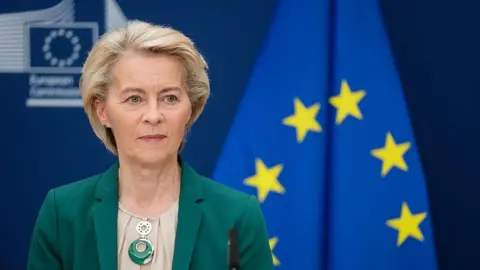EU Postpones Retaliatory Tariffs Against US Amid Ongoing Trade Negotiations
EU Postpones Retaliatory Tariffs Against US Amid Ongoing Trade Negotiations
The European Union has once again delayed the implementation of its retaliatory trade tariffs against the United States. This decision, announced by European Commission President Ursula von der Leyen, provides a crucial window for continued dialogue and negotiation between the two economic powerhouses. The EU’s countermeasures, initially set to be enacted in response to the US’s own import taxes on steel and aluminum, have been suspended until early August, a move that signals a preference for a diplomatic resolution over escalating trade tensions.

These retaliatory measures, valued at €21 billion, were first put on hold in March, and this latest extension underscores the EU’s commitment to finding a mutually agreeable solution. President von der Leyen emphasized that while the suspension is in place, the EU will continue to prepare its countermeasures, ensuring readiness should negotiations falter. “The United States has sent us a letter with measures that would come into effect unless there is a negotiated solution,” von der Leyen stated, “so we will therefore also extend the suspension of our countermeasures until early August.” She reiterated the EU’s consistent stance: “we have always been very clear that we prefer a negotiated solution.”
Defending European Interests Through Dialogue
The decision to delay tariffs comes as US President Donald Trump has indicated his intention to impose a 30% tariff on EU imports starting August 1st. Trump has also warned of further escalations if the EU retaliates. In a recent interview, he highlighted the significant revenue generated by these tariffs, claiming “hundreds of billions of dollars” are “pouring in.” This creates a complex backdrop for upcoming discussions.
EU trade ministers are scheduled to convene in Brussels to strategize their approach. German Finance Minister Lars Klingbeil stressed the need for “serious and solution-oriented negotiations” while also affirming the EU’s preparedness to implement “decisive countermeasures to protect jobs and businesses in Europe” if talks fail. He remarked, “Our hand remains outstretched but we won’t accept just anything.” Similarly, French President Emmanuel Macron has urged the European Commission to “resolutely defend European interests,” reflecting a united front among key EU member states.
The ongoing trade dispute involves a significant portion of global trade, with the Trump administration having proposed tariff conditions on numerous countries, including the 27-nation EU bloc. While the US has secured preliminary trade agreements with the UK and Vietnam, negotiations with other partners, including the EU, remain active. The EU’s willingness to extend the pause on retaliatory tariffs demonstrates a strategic effort to de-escalate the situation and pursue a path of economic cooperation rather than confrontation.



Post Comment